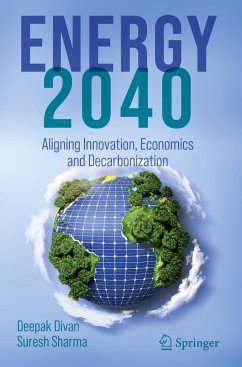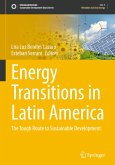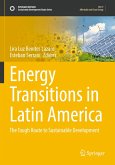Access to energy is essential for our daily lives, economic growth, environment, and sustainability. However, our use of fossil fuels has contributed to global climate change, which poses a significant threat to society and life on this planet. Yet, it has been challenging to reconcile the perceived conflict between economics and climate change, which has created deep divisions in our society.
ENERGY 2040: Aligning Innovation, Economics, and Decarbonization provides a holistic and comprehensive analysis of the ongoing energy transition and its underlying causes. It presents a viable path to meet the energy, economic, and climate goals by weaving together science, technology, economics, policy, entrepreneurship, and geopolitics. The book presents a captivating narrative that brings together a range of topics, including new and disruptive technologies with steep learning rates, the challenges of the future power grid, the democratization of energy, and reducing the timeline from science to impact at scale. It also explores the complex role of scientific research, disruptive deep tech, entrepreneurship, and policy in accelerating this energy transformation.
This book is a must-read for anyone interested in understanding the future of energy. Whether you're a scientist, energy-industry practitioner, policymaker, investor, student, or concerned citizen, this book offers critical insights into the complex and evolving world of energy, innovation, decarbonization, and climate change.
ENERGY 2040: Aligning Innovation, Economics, and Decarbonization provides a holistic and comprehensive analysis of the ongoing energy transition and its underlying causes. It presents a viable path to meet the energy, economic, and climate goals by weaving together science, technology, economics, policy, entrepreneurship, and geopolitics. The book presents a captivating narrative that brings together a range of topics, including new and disruptive technologies with steep learning rates, the challenges of the future power grid, the democratization of energy, and reducing the timeline from science to impact at scale. It also explores the complex role of scientific research, disruptive deep tech, entrepreneurship, and policy in accelerating this energy transformation.
This book is a must-read for anyone interested in understanding the future of energy. Whether you're a scientist, energy-industry practitioner, policymaker, investor, student, or concerned citizen, this book offers critical insights into the complex and evolving world of energy, innovation, decarbonization, and climate change.
"A Particularly intriguing aspect of the book is turning society's Faustian bargain upside down. ... The book is aimed at a technically literate public, and should help power electronics experts and others to participate in balanced and insightful discussions of our energy future. It is extremely encouraging to see how some of our leading technology experts are working across the spectrum of stakeholders and communicating a vision for the future." (Philip T. Krein, IEEE Power Electronics Magazine, Vol. 11 (2), June, 2024)
"This book is accessible to a broad audience. It is a solid resource for those who want to understand the current interplay of technology, economics, policy, and innovation in the energy sector. ... Existing and aspiring leaders can provide significant value to their organizations by reading this book and pondering the questions it raises." (Frank Kreikebaum, IEEE Power and Energy Magazine, Vol. 22 (4), July-August, 2024)
"This book is accessible to a broad audience. It is a solid resource for those who want to understand the current interplay of technology, economics, policy, and innovation in the energy sector. ... Existing and aspiring leaders can provide significant value to their organizations by reading this book and pondering the questions it raises." (Frank Kreikebaum, IEEE Power and Energy Magazine, Vol. 22 (4), July-August, 2024)








